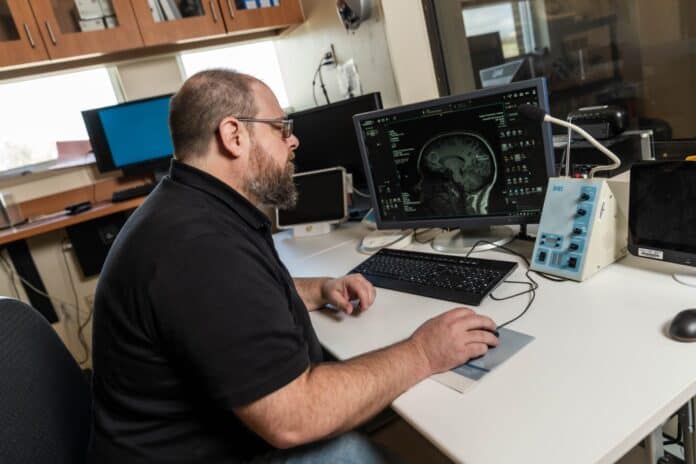National Recovery Month, which began in 1989 and is observed in September, raises awareness of evidence-based approaches to treating addiction. Scientists with Virginia Tech’s Fralin Biomedical Research Institute at VTC are advancing research that provides new tools for recovery, reduces the risk of relapse, and helps individuals make healthier decisions and stay engaged in treatment.
Scientific advances at the research institute are providing a deeper understanding of neural pathways involved in various substance use disorders, the role of the brain’s reward system, and the promise of new therapies, such as GLP-1 receptor agonists, in curbing cravings.
“Recovery isn’t one-size-fits-all,” said Stephen LaConte, interim co-director of the Fralin Biomedical Research Institute’s Addiction Recovery Research Center. “Across our addiction and health-behaviors research, we’re advancing personalized strategies — new statistical methods to untangle polysubstance use, brain-based biomarkers to guide care, and tech-in-the-wild experiments that ground lab insights in everyday life.”
“We’re also studying GLP-1–based therapies, which may offer holistic benefits — from diabetes management to potentially easing cravings,” LaConte said. “And through the International Quit & Recovery Registry, launched by founding director Warren Bickel, we learn directly from people in recovery what helps them succeed.”
Faculty members in the Addiction Recovery Research Center and the Center for Health Behaviors Research are available for interviews to discuss the science behind recovery strategies and what the latest findings reveal about how to better support individuals with substance use disorders.
In addition to ongoing research, these published findings highlight advances in our understanding of addiction:
- Brain scans show therapeutic approach to address addiction. Addiction often prioritizes short-term rewards over long-term well-being. Researchers found changes in key brain regions with a therapy called episodic future thinking, which helps people vividly imagine positive events in their future to make healthier decisions in the present. The therapy shows promise in improving decision-making and reducing impulsive behavior.
- Relapse is common, and multiple attempts at quitting are part of the process. Researchers have found that the number of quit attempts before successful recovery varies by substance and other individual factors. The findings suggest that early intervention improves success and reduces relapses. Their work helps set expectations for those in recovery and provides practical guidance for clinicians and patients alike.
- What food addiction can teach us about substance use. Scientists are exploring how patterns of overconsumption in highly processed foods mirror substance addiction — and how these behaviors can be modified. By studying food addiction, researchers are uncovering new ways to understand compulsive behavior, brain reward systems, and self-regulation to help address rising rates of obesity, overweight, and related diseases.
- Can diabetes and weight loss drugs help treat alcohol use disorder?Medications originally developed to treat Type 2 diabetes, including GLP-1 receptor agonists, are being investigated as potential treatments for alcohol use disorder. Research shows these drugs may reduce alcohol cravings by influencing brain reward pathways. This line of inquiry offers hope for new tools to support recovery.
- Menthol restrictions may help smokers substitute healthier alternatives.More than 9 million adults, or about 32 percent of all smokers, use menthol cigarettes, according to the Centers for Disease Control and Prevention. A team of researchers at the Fralin Biomedical Research Institute at VTC, found that if menthol products were unavailable, smokers were more willing to purchase replacement therapies such as nicotine gum and lozenges, potentially improving health outcomes for people who smoke menthol cigarettes.
- Listening to people in recovery to improve care. The International Quit & Recovery Registry, launched by the Fralin Biomedical Research Institute in September 2011, is a global community of more than 10,000 people in recovery. The directory has been a powerful tool in helping addiction researchers improve recovery programs and identify psychological and social factors that contribute to long-term success.


